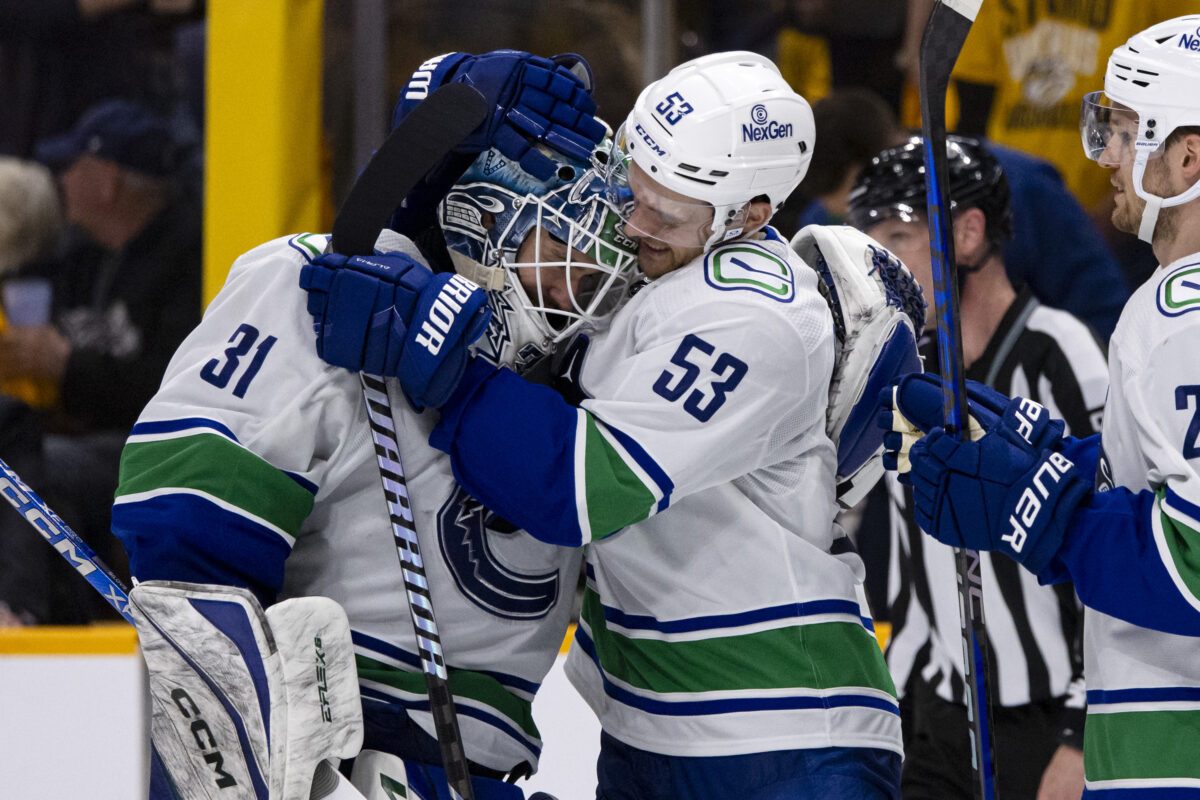The Vancouver Canucks finally dispatched the Nashville Predators on Friday night in Game 6, winning a hard-fought battle 1-0, thus claiming the series 4-2. As expected, it was a valiantly fought contest between two sides that had engaged in close calls for nearly two weeks. As Game 6 wore on, though, something was happening. Something was burgeoning before the eyes of everyone at Bridgestone Arena and watching the telecast. Something Canucks fans had hoped for, and, presumably Predators fans dreaded. The real Canucks stood up.
Potent Vancouver Comes Through
What made the Canucks’ Game 6 performance all the more impressive was the fact that it was a closeout contest. After all, so had been Game 5, and they played well in that one, too, despite suffering a bitter defeat. Nay, the sixth bout was special because it was in Nashville. Say what one will about Vancouver’s heroics in Games 3 and 4 – also as the away side – but they didn’t exactly look like the better side. Game 4 was essentially theft.
They needed a match on the road, in the notoriously tough environment of Bridgestone, that looked as though they were playing at home. They needed to be swift, confident, skillful, inventive, and thoughtful. Asking the hockey gods to allow Vancouver to pull off another road miracle despite a mostly dubious performance would have been a massive gamble.
To the club’s and Rick Tocchet’s credit, they answered the bell. Pius Suter, who scored the game and series clincher, was extraordinary. He found himself in the right place at the right time on several occasions, only for the typically brilliant Juuse Saros to rob him. That is until there was only 1:39 left in regulation. It capped off Vancouver’s most impressive showing of the series. A 1-0 final suggests a good battle, and that it was, but this time, for once, the Canucks looked like the better team and actually won.
They registered 29 shots on target, their highest tally of all six matches. They had less than 10 at the end of the first period, and it looked as though things were taking a turn similar to the earlier games in Nashville. Whatever was said during the first intermission, it worked because the Canucks never looked back. Brock Boeser was clever and great, and so was Connor Garland. Elias Pettersson looked hungrier. Everyone looked hungrier. Faceoffs were won, space was found to skate through, battles were won against the boards, and pressure was kept in Nashville’s zone.
You what the Canucks looked like? A team that had won its division and amassed 109 points in the regular season.
Holy Goalie Trinity
It is stupendous to consider that Vancouver has taken the series with three different starting goalies: Thatcher Demko, Casey DeSmith, and Arturs Silovs
The latter stood tall in Games 4 through 6 and looked about as comfortable as a netminder playing in their 100th Stanley Cup Playoff bout. A slick glove save early in the first period was indicative of how calm and collected he was.
Related: Arturs Solivs’ Confidence Soaring With Vancouver Canucks’ Win
All teams have a goalie coach. In Vancouver, that happens to be Ian Clark. This is his second time working with the Canucks organization in the same role. His first time lasted from 2002-03 through the 2009-10 campaigns. Many will remember that decade as the great Roberto Luongo years, and that they were. But Clark may have just painted his masterpiece. To get through a playoff series with a team that possessed precious little authentic postseason experience and its top two goalies injured is a remarkable feat.

The most unbelievable aspect of the entire escapade is that none of them played poorly. One wouldn’t expect Demko to falter; he’s a Vezina Trophy finalist. But DeSmith was great if unlucky in Game 2 and was sound in Game 3. Silovs was equally solid in Game 4, did what he could in Game 5 in defeat, and earned a fantastic shutout in Game 6. It’s easy to argue that all clubs go through trials and tribulations during their Stanley Cup Playoff journeys. No one is disputing that. This, however, was something else.
Do or Die by Special Teams
There weren’t many occasions for the special teams to shine in the sixth match. Both clubs took four penalties combined, two of which were simultaneous, resulting in a brief spell of four-on-four hockey.
That’s what made the two sequences during which Vancouver had to survive a penalty kill so special. The first was Boeser’s high-sticking double-minor in the middle frame. With the score tied 0-0 and the Canucks playing well, this had the potential to rock the boat. It never did. The Predators produced virtually no pressure on the Canucks. Moreover, it was Vancouver who created the best scoring chance, with Saros gloving a Pettersson wrist shot.
Then there was the Elias Lindholm cross-check at 19:26. Yes, a cross-checking penalty with 34 seconds remaining in a playoff game as the Canucks clung to a 1-0 advantage and the series at 3-2. What ensued was utter madness and chaos around the Vancouver net, a version of six-on-four hockey that looked as desperate as one can imagine for both the team trying to tie the score and the one preventing that from happening.
Unless the Toronto Maple Leafs play spectacularly dirty hockey in Game 7 against the Boston Bruins (yet to be played as of this writing), the Canucks will have taken the third-most penalty minutes in the first round with 52 yet managed those instances with a 90.9% efficient penalty kill.
Canucks fans can breathe easy. Their side has put its Round 1 opponent to the sword. Or the predator became the prey, what have you. The players and fans will no doubt enjoy their weekend, but next week sees Round 2 commence with a brand new, far more dangerous opponent waiting in the wings: the Edmonton Oilers.
